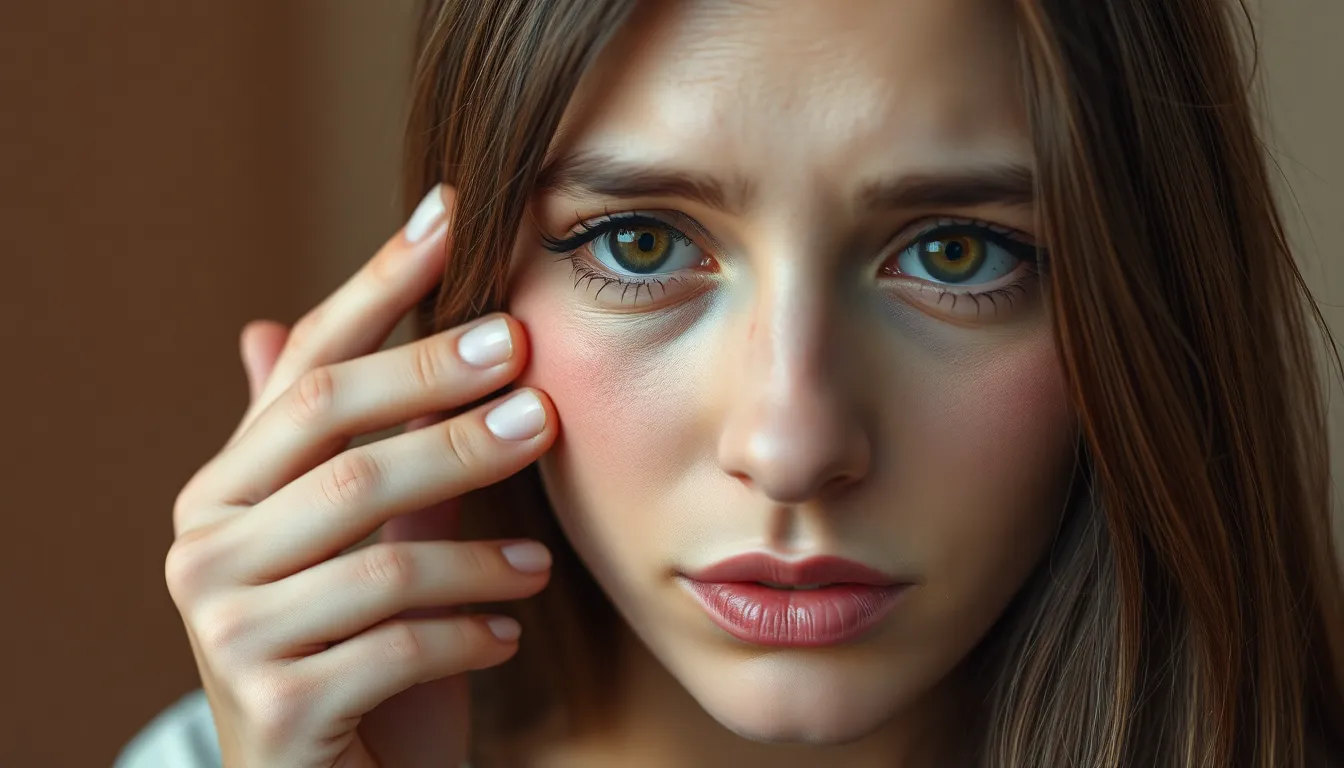Table of Contents
ToggleWhen it comes to skincare, the area under the eyes often feels like a neglected child in a crowded family. Yet, for many, it’s a battleground for eczema and dry skin, turning the delicate skin into a flaky desert. If you’ve ever looked in the mirror and thought your under-eyes resemble a lizard’s skin—don’t worry, you’re not alone.
Understanding Eczema Dry Skin Under Eyes
Eczema dry skin under the eyes often stems from a combination of genetic factors and environmental triggers. Individuals may experience redness, irritation, and flaking in this sensitive area due to exacerbated reactions to pollutants or allergens. The skin under the eyes is thinner compared to other facial areas, making it more vulnerable to dryness and inflammation.
People dealing with eczema may discover that harsh skincare products worsen their condition. Ingredients like alcohol or synthetic fragrances irritate the delicate skin barrier, resulting in increased dryness. Selecting gentle, hypoallergenic moisturizers can provide relief.
Symptoms vary among individuals. Some may find they have tightness or itching, while others face visible scaling or peeling skin. Severity often fluctuates with lifestyle factors, including stress levels, diet, and seasonal changes. Monitoring these aspects can help manage flare-ups more effectively.
Moisturizing daily plays a crucial role in managing eczema dry skin under the eyes. Occlusive agents such as petroleum jelly and ceramides help retain moisture and enhance barrier function. Regular application, especially after washing the face, prevents dehydration.
Consulting a dermatologist offers valuable insights for persistent issues. A professional may prescribe topical corticosteroids for short-term relief or recommend specific emollients tailored to individual needs. Understanding the triggers and responses ensures that treatment strategies remain effective.
Awareness of eczema’s impact on skin under the eyes leads to better management. Addressing both skincare and lifestyle comprehensively supports healthier skin in this delicate area.
Symptoms and Signs

Eczema dry skin under the eyes presents various symptoms. Understanding these signs can aid in earlier intervention and relief.
Common Indicators
Redness often appears first in the under-eye area. Flaking skin can follow, creating a dry and irritated appearance. Individuals may experience itching that leads to discomfort. Swelling might also occur, causing a puffy look around the eyes. Sensitivity to products like makeup or cleansers increases when eczema is present. Dark circles can develop due to inflammation and irritation. Recognizing these common indicators helps in identifying personal triggers.
When to Seek Help
Consultation with a dermatologist is advisable when symptoms worsen. Persistent redness or severe itching may indicate an escalation of eczema. If over-the-counter treatments fail to provide relief, professional assistance is necessary. Individuals experiencing swelling that hinders vision should seek immediate care. Changes in skin texture or new symptoms also warrant prompt evaluation. Timely intervention ensures effective management and may prevent further complications.
Causes of Eczema Dry Skin Under Eyes
Eczema dry skin under the eyes results from a mix of factors. Understanding these causes can lead to better management of symptoms.
Environmental Factors
Environmental factors play a significant role in triggering eczema under the eyes. Exposure to allergens such as pollen, dust mites, and pet dander can worsen sensitivity. Extreme weather conditions, particularly cold or dry air, can strip moisture from the delicate skin. Additionally, harsh chemicals in skincare products can irritate the skin and lead to flare-ups. Pollution and smoke also contribute to inflammation, making skin more prone to dryness. Maintaining a clean and controlled environment can reduce these triggers significantly.
Genetic Predisposition
Genetic predisposition affects many individuals with eczema. Family history often suggests a higher likelihood of developing skin conditions. Specific genes linked to skin barrier function determine how well skin retains moisture. Those with a family background of eczema, asthma, or allergies may face a greater risk. This genetic link implies that managing symptoms might require tailored approaches. Seeking advice from a dermatologist can help individuals understand their unique genetic makeup and create an effective care routine.
Treatment Options
Various treatment options exist for managing eczema dry skin under the eyes. Individuals can benefit from both topical treatments and lifestyle changes tailored to their specific needs.
Topical Treatments
Topical corticosteroids often provide quick relief from inflammation. Emollients moisturize and protect the delicate under-eye area by locking in hydration. Products containing ceramides and hyaluronic acid are particularly effective in restoring the skin barrier. Using fragrance-free formulations minimizes irritation, while patch testing new products helps avoid adverse reactions. Avoiding harsh ingredients while focusing on gentle formulations supports healing and prevents flare-ups.
Lifestyle Changes
Implementing lifestyle changes can significantly improve skin condition. Reducing exposure to allergens such as pollen, dust, or pet dander lowers the risk of flare-ups. Maintaining a consistent hydration routine by drinking water supports overall skin health. Choosing a balanced diet rich in omega-3 fatty acids, fruits, and vegetables provides essential nutrients. Moreover, managing stress through mindfulness techniques or physical activity contributes to reducing eczema symptoms. Wearing sunglasses shields the under-eye area from environmental elements, offering an extra layer of protection.
When to Consider Professional Help
Consulting a dermatologist becomes necessary when symptoms persist or worsen. Seeking professional guidance is essential if over-the-counter treatments fail to provide relief. In cases of severe redness, swelling, or intense itching, timely intervention prevents complications. A dermatologist can prescribe stronger topical treatments or recommend phototherapy to manage persistent conditions. Understanding the importance of professional help ensures the development of an effective, personalized treatment plan.
Preventive Measures
Preventive measures for eczema dry skin under the eyes focus on maintaining skin hydration and avoiding irritants. Establishing a consistent skincare routine plays a crucial role in protection.
Daily Skincare Routine
Gentle cleansing is essential. Use a mild, fragrance-free cleanser to avoid irritation. Following cleansing, apply a hypoallergenic moisturizer specifically designed for sensitive skin. This keeps the under-eye area hydrated throughout the day. Incorporating products with ingredients like ceramides and hyaluronic acid can strengthen the skin barrier. Consistency in applying moisturizer twice daily is vital for effective management. Additionally, including sunscreen protects against UV damage, reducing inflammation.
Avoiding Triggers
Identifying triggers is pivotal for controlling eczema flare-ups. Common allergens, such as dust mites and pollen, should be minimized. Cleaning the home regularly helps reduce exposure to these irritants. Extreme temperatures can also provoke symptoms. Dressing accordingly for seasonal changes prevents irritation. When applying new skincare products, patch testing helps determine any adverse reactions. Staying aware of personal sensitivities promotes better skin health. Stress management techniques, like meditation and exercise, contribute positively to overall skin condition.
Eczema dry skin under the eyes requires careful attention and management. By understanding the causes and symptoms, individuals can take proactive steps to alleviate discomfort. A consistent skincare routine featuring gentle, hypoallergenic products is crucial for maintaining hydration and preventing flare-ups.
Identifying personal triggers and making lifestyle adjustments can also play a significant role in improving skin health. Consulting a dermatologist ensures tailored treatment options are available when symptoms persist. With the right approach, achieving healthier skin in this delicate area is possible, leading to increased comfort and confidence.





